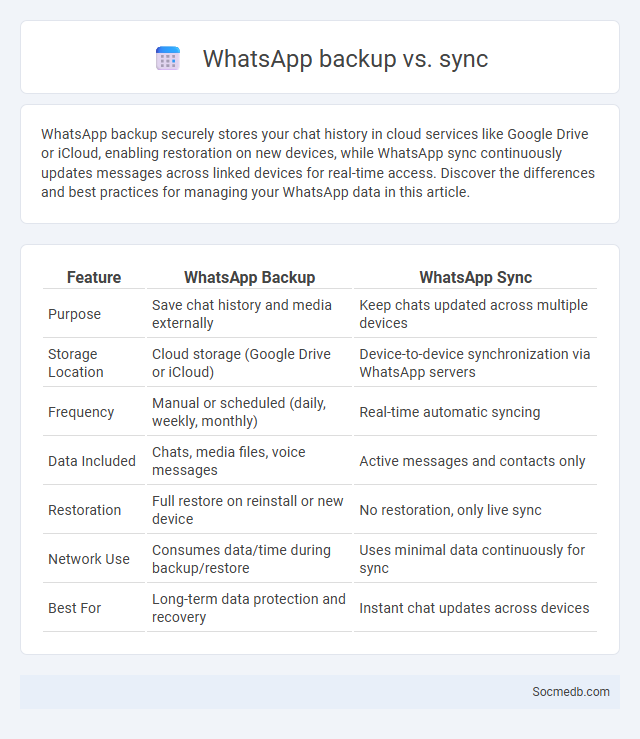
Photo illustration: WhatsApp backup vs sync
WhatsApp backup securely stores your chat history in cloud services like Google Drive or iCloud, enabling restoration on new devices, while WhatsApp sync continuously updates messages across linked devices for real-time access. Discover the differences and best practices for managing your WhatsApp data in this article.
Table of Comparison
| Feature | WhatsApp Backup | WhatsApp Sync |
|---|---|---|
| Purpose | Save chat history and media externally | Keep chats updated across multiple devices |
| Storage Location | Cloud storage (Google Drive or iCloud) | Device-to-device synchronization via WhatsApp servers |
| Frequency | Manual or scheduled (daily, weekly, monthly) | Real-time automatic syncing |
| Data Included | Chats, media files, voice messages | Active messages and contacts only |
| Restoration | Full restore on reinstall or new device | No restoration, only live sync |
| Network Use | Consumes data/time during backup/restore | Uses minimal data continuously for sync |
| Best For | Long-term data protection and recovery | Instant chat updates across devices |
Understanding WhatsApp Backup, Sync, and Chat Backup
WhatsApp backup ensures your chat history and media files are securely stored on cloud services like Google Drive or iCloud, allowing easy restoration when switching devices. Sync operations keep your messages and contacts updated across devices, maintaining seamless communication. Understanding these features helps you protect your data and enhances your overall messaging experience.
Key Differences Between WhatsApp Backup and Sync
WhatsApp backup stores your chat history and media files securely on cloud services like Google Drive or iCloud, enabling restoration in case of device loss or reinstallation. Sync, however, continuously updates and aligns your WhatsApp data across multiple devices, ensuring real-time consistency without requiring manual recovery. Understanding these key differences helps you manage your chat data effectively, keeping Your conversations both safe and accessible.
How WhatsApp Handles Chat Backup
WhatsApp encrypts chat backups to enhance your data security, utilizing end-to-end encryption for messages stored in Google Drive or iCloud. The platform allows automatic backups on a regular schedule, ensuring your conversations remain accessible even if you switch devices. You can also manage backup frequency and decide whether to include videos, giving you control over storage and data usage.
Storage Options for Backups in WhatsApp
WhatsApp provides multiple storage options for backing up your chats and media, including Google Drive for Android users and iCloud for iPhone users, ensuring seamless data recovery. Your backup frequency can be customized to daily, weekly, or monthly intervals to suit your storage needs and data usage. Local backup storage on your device also offers an additional layer of security, allowing you to restore conversations even without cloud access.
Pros and Cons of WhatsApp Backup
WhatsApp backup offers the advantage of safeguarding Your chat history and media files, enabling seamless restoration when switching devices or after accidental deletions. However, it may consume significant storage space and pose privacy risks if backups are not encrypted or stored securely. Understanding these trade-offs helps You decide whether WhatsApp backup aligns with Your data protection and accessibility needs.
Benefits and Limitations of Syncing on WhatsApp
Syncing your contacts and messages on WhatsApp enhances communication by seamlessly integrating your phone's address book, ensuring you stay connected with friends, family, and colleagues without manual updates. It improves message continuity across devices but can pose privacy concerns if sensitive information is inadvertently shared or backed up to cloud services. Understanding these benefits and limitations helps you maintain control over your social interactions and data security on social media platforms.
Data Security in WhatsApp Backup vs Sync
WhatsApp Backup and Sync handle your data security differently, with Backup storing encrypted copies of your chat history in cloud services like Google Drive or iCloud, which may be vulnerable to unauthorized access if your cloud account is compromised. Sync typically involves real-time data replication across your devices, maintaining encryption but potentially exposing your information to interception during transfer if encryption protocols are weak or outdated. Understanding these differences helps you manage privacy risks effectively and safeguard your social media communications.
Steps to Perform Chat Backup in WhatsApp
To perform a chat backup in WhatsApp, open the app and go to Settings > Chats > Chat Backup. Choose the backup frequency and select the Google Drive or iCloud account to store your chat history and media files securely. Ensuring your WhatsApp is connected to Wi-Fi will help You complete the backup process quickly without using excessive mobile data.
Troubleshooting Common Backup and Sync Issues
Social media backup and sync issues often stem from insufficient storage space, unstable internet connections, or outdated app versions. Ensuring sufficient cloud storage, maintaining a strong Wi-Fi or cellular connection, and regularly updating social media platforms like Facebook, Instagram, or Twitter can resolve most synchronization problems. Clearing cache and verifying account permissions further help restore seamless backup and sync functionality.
Choosing the Best Method: Backup, Sync, or Chat Backup
Choosing the best method for safeguarding your social media data depends on your specific needs for accessibility, security, and storage. Backup options create a secure copy of your data stored externally, ensuring recovery in case of loss, while sync methods keep your information updated across multiple devices in real-time. Your chat backup choices focus on preserving conversations within social media apps, often encrypted for privacy, making it essential to evaluate which approach best aligns with your data safety and convenience preferences.
 socmedb.com
socmedb.com